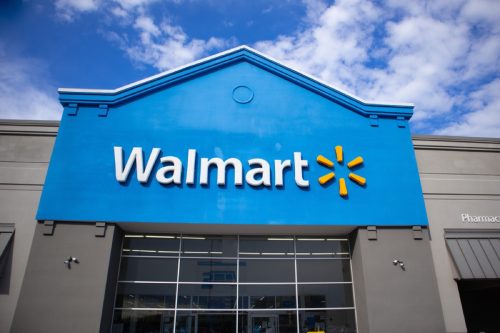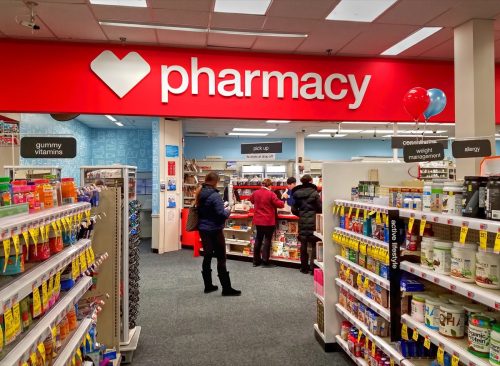Walmart, Walgreens, and CVS Are Being Fined $650 Million—Here's Why
This hefty fine will be paid out over the next 15 years.

Big-name retailers are familiar with legalese, as litigation pretty much comes with the territory. Companies like Walmart, CVS, and Walgreens are often hit with lawsuits, ranging from marketing issues and false pricing to more serious allegations about a lack of medication warnings and financial fraud. But now, this trio of retailers have been slapped with a hefty fine totaling over $650 million. Read on to find out why the companies are now being forced to pay hundreds of millions of dollars.
READ THIS NEXT: Walmart and Dollar General Are Under Fire for Doing This to Shoppers.
The opioid epidemic remains a public health crisis in the U.S.

Contrary to what pharmaceutical companies stated in the 1990s, opioid pain relievers are highly addictive medications, which has led to catastrophic misuse. Overprescription combined with these pills' abuse potential resulted in the opioid epidemic, which has since claimed the lives of almost 500,000 Americans between 1999 and 2019, according to data from the Centers for Disease Control and Prevention (CDC). This staggering number was tallied over the course of three "waves," which began in the 1990s when opioids were first overprescribed, and was followed by a second wave in 2010, when heroin—a semi-synthetic opioid—contributed to a major and rapid uptick in overdose deaths. In 2013, the third wave began, as overdose deaths were traced to synthetic opioids "involving illicitly manufactured fentanyl."
The CDC estimates that 136 people die every day from an opioid overdose, and multiple agencies are currently working to combat the crisis. As opioids are controlled substances that require a prescription, pharmacies are in charge of dispensing these medications, and a new ruling is holding three of the biggest—CVS, Walgreens, and Walmart—responsible for the role they reportedly played.
The retailers will be making payments for 15 years.

On Aug. 17, U.S. District Judge Dan Polster in Cleveland ruled that all three pharmacy chains must pay $650.6 million in damages to two counties in Ohio, The Washington Post reported. Over the next 15 years, Lake County will receive $306.2 million, and Trumbull County will receive $344.4 million, per CNN.
According to the ruling, CVS, Walmart, and Walgreens are partially culpable as they did not have "effective controls and procedures" in place to prevent the resale and abuse of these pills, making them partially to blame for the resultant damage, per The Washington Post. The ruling follows a Nov. 2021 jury decision, which found that all three pharmacies played a role in the crisis in both Lake and Trumbull counties.
"Today marks the start of a new day in our fight to end the opioid epidemic," John Hamercheck, Lake County Commissioner, said in a statement after the ruling was announced, per the Associated Press.
Some are calling this a "landmark" case.

While experts estimated that it will cost both Lake and Trumbull counties $3.3 billion to recover from their losses, the counties intend to put the money awarded to them toward battling the crisis, CNN reported.
According to The Washington Post, the ruling also requires CVS, Walmart, and Walgreens to enact precautionary measures, including training staff on how to properly dispense controlled substances like opioids, setting up a hotline for reporting "inappropriate sales," and hiring a "controlled-substance compliance officer."
According to Axios, this ruling could set a precedent for future lawsuits, as it is the first to mandate that pharmacy chains pay a set amount related to their role in the opioid epidemic.
RELATED: For more up-to-date information, sign up for our daily newsletter.
Walmart issued a public statement.

Walmart published a formal statement addressing the lawsuit, claiming that the plaintiff's attorneys were "in search of deep pockets," when filing the lawsuit and that the trial "was riddled with remarkable legal and factual mistakes." It plans to appeal.
The retailer further stated that the "real causes" of the crisis include "pill mill doctors, illegal drugs and regulators asleep at the switch." Walmart added that the law doesn't intend for pharmacists to "second-guess doctors," alleging that this "interferes with the doctor-patient relationship," per federal and state health regulators.
CVS and Walgreens also spoke out after the ruling.

In a statement to Best Life, CVS said the decision was a "misapplication of public nuisance law."
"We strongly disagree with the Court's decision regarding the counties' abatement plan, as well as last fall's underlying verdict," CVS said. "Pharmacists fill legal prescriptions written by DEA-licensed doctors who prescribe legal, FDA-approved substances to treat actual patients in need. We look forward to the appeals court review of this case."
Just last week, Walgreens was also found liable in an opioid lawsuit in San Francisco, and in May, the pharmacy chain reached a $620 settlement with the state of Florida.
In a statement to Best Life, Walgreens Director of Global Corporate Communications Scott Goldberg said, "We are disappointed with this outcome. The facts and the law did not support the jury verdict last fall, and they do not support the court's decision now. The court committed significant legal errors in allowing the case to go before a jury on a flawed legal theory that is inconsistent with Ohio law and compounded those errors in reaching its ruling regarding damages. As we have said throughout this process, we never manufactured or marketed opioids nor did we distribute them to the 'pill mills' and internet pharmacies that fueled this crisis. The plaintiffs' attempt to resolve the opioid crisis with an unprecedented expansion of public nuisance law is misguided and unsustainable. We look forward to the opportunity to address these issues on appeal."





















